Guatemala’s democracy hangs in the balance as it faces its most crucial hours
Tense days are unfolding in the Central American nation following a court ruling to review the unexpected outcome of the initial round of voting
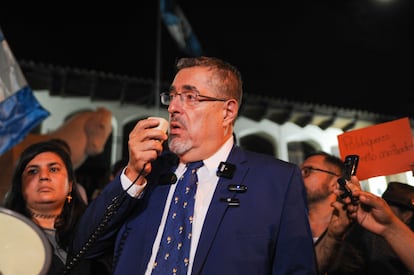

Over the weekend, Lucy Rodríguez posted a tweet expressing her support for the first round results of the elections in Guatemala. The unexpected advancement of candidate Bernardo Arévalo and his Movimiento Semilla (Seed Movement) party to the runoff caused a political earthquake. Alarmed, the country’s established political parties sought recourse from the courts. The Constitutional Court responded by suspending the certification of the election results and ordered an audit. In a show of support, thousands of Guatemalans took to social media to demonstrate the fairness of the election. Lucy Rodríguez posted the official vote tally from her polling station, where Arévalo won overwhelmingly. Tense days are unfolding in Guatemala with its democracy facing its most critical hours.
The Constitutional Court’s decision was strongly reproached by former judges and prosecutors who have been actively fighting corruption in the Central American nation. The move has also sparked concern among journalists, media outlets and politicians who sounded dire warnings about the consequences of the audit in a country where voters have loudly expressed dissatisfaction with the traditional powers. Claudia Paz y Paz, the former attorney general who led investigations into the genocide committed during the civil war, said, “The Constitutional Court has violated electoral procedure by ordering another review of the vote count. It’s a breach of the Electoral and Political Parties Law.”
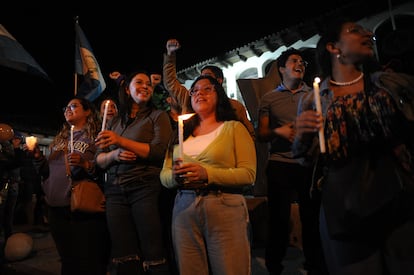
On July 1, Guatemala’s Constitutional Court ordered a suspension of the process to certify the results of the June 25 vote after nine political parties raised allegations of voting irregularities. The ruling mandates a thorough recount of voting records, and tasked the Electoral Court with ensuring complete clarity by the scheduled date of the presidential runoff. The Constitutional Court’s decision has faced strong criticism from Bernardo Arévalo, who secured nearly 12% of the vote, enough to advance to the second round. The runoff will take place on August 20, and pits Arévalo against former First Lady Sandra Torres, who garnered the highest number of votes (approximately 16%). ”We stand united in defense of democracy! We stand with the resilient people of Guatemala who refuse to be cheated!” declared Arévalo. Observers from the progressive movement, which arose from the 2015 anti-government protests, immediately began monitoring the court-ordered review. “We diligently oversee the process to safeguard democracy,” said Arévalo.
As tensions rose by the hour, the country’s polarization became increasingly strident. Conservative sectors, backed by influential evangelical churches, launched attacks on Arévalo. The messages range from instilling fear of communism among the upper classes to warning of a potential Venezuela-like state in Guatemala, with its deteriorating economy and repression of critical voices. “It’s not only about Guatemala maintaining religious freedom, but also about it staying true to its conservative roots with strong principles and values,” said Cash Luna, pastor of the Casa de Dios, a very conservative evangelical organization with thousands of followers.
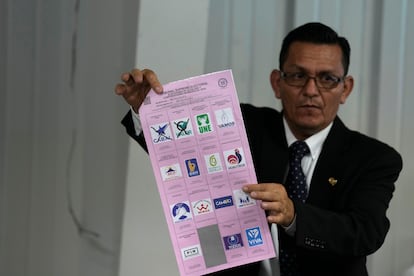
Some traditional political figures, including Edmond Mulet, a presidential candidate from the Cabal Party, have expressed their discontent with the Court’s decision. Mulet firmly opposes any attempt to make changes to the electoral timeline. “Creating artificial problems in the vote certification process represents a danger to democracy in Guatemala,” said Mulet. The politician stated that when his party’s observers reviewed the records and compared them with the results presented by the Electoral Tribunal, “no significant discrepancies were found. We don’t expect any changes in the results for the first and second place candidates who will advance to the second electoral round,” said Mulet. He also warned that “anything that undermines the democratic system puts the political and social stability of Guatemala at risk.”
Many of the sources we consulted say that the attempts to discredit the June 25 results come from “de facto powers” that control Guatemala. They allege that a “corruption pact” has led to a criminal alliance that unites influential entrepreneurs, established political parties, retired military personnel, organized crime networks and government officials who seek to perpetuate a system of impunity and preserve a status quo where accountability is elusive. President Alejandro Giammattei has been directly accused of undermining democracy in the country by exerting control over key institutions, such as the courts, through the appointment of judges aligned with his interests. “The established parties turned to the ‘cartel of the robe’ – the courts that answer to an entrenched deep-state mafia — in a desperate attempt to overturn the electoral outcome,” said Juan Francisco Sandoval, a former anti-corruption attorney general.
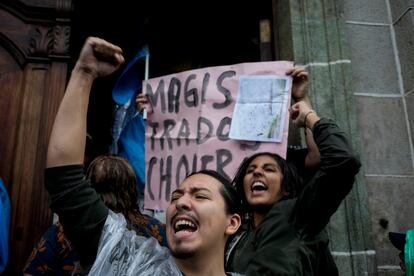
Sandoval is one of many anti-corruption crusaders in the legal profession targeted by a relentless smear campaign. Threatened with lawsuits and imprisonment, he had to go into exile to avoid arrest for doing his job. “The ruling of the Constitutional Court appears to be arbitrary, as it interprets the Constitution very broadly and thwarts the Supreme Court’s authority,” said Sandoval. “These parties have turned to manipulating the Constitutional Court, a practice we have long decried because it’s in the pocket of Guatemalan political elites who seek to preserve a system of privileges at the expense of the people.”
According to Sandoval, the deadline for contesting electoral results, as stipulated by electoral law, has lapsed. He asserts that the unchallenged vote tallies attest to the validity of the outcomes. “This is a desperate, quasi-legal move. These parties never thought that Arévalo’s movement would get so many votes,” he said. He claims that the polling stations were a “transparent citizen initiative,” and that the traditional political parties were caught by surprise at the results. “I know that the attorneys for those parties were instructed to challenge the votes of other parties that might make it to the second round. But here’s the thing — Arévalo’s movement came out on top in many polling stations and there were no challenges because it was such a surprise. And when time ran out, they had no other option but to turn to the Constitutional Court, who issued a decision that favors the ruling party and discredits the entire electoral process.”
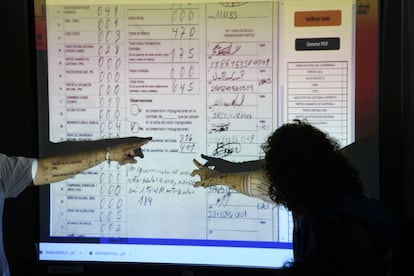
Amid escalating tension in Guatemala, many are worried about the citizen outrage that would explode if the election results were voided. “Through their vote, the people found a powerful voice and a means to vent their frustration at the ruling political class,” said Sandoval.
Sign up for our weekly newsletter to get more English-language news coverage from EL PAÍS USA Edition
Tu suscripción se está usando en otro dispositivo
¿Quieres añadir otro usuario a tu suscripción?
Si continúas leyendo en este dispositivo, no se podrá leer en el otro.
FlechaTu suscripción se está usando en otro dispositivo y solo puedes acceder a EL PAÍS desde un dispositivo a la vez.
Si quieres compartir tu cuenta, cambia tu suscripción a la modalidad Premium, así podrás añadir otro usuario. Cada uno accederá con su propia cuenta de email, lo que os permitirá personalizar vuestra experiencia en EL PAÍS.
¿Tienes una suscripción de empresa? Accede aquí para contratar más cuentas.
En el caso de no saber quién está usando tu cuenta, te recomendamos cambiar tu contraseña aquí.
Si decides continuar compartiendo tu cuenta, este mensaje se mostrará en tu dispositivo y en el de la otra persona que está usando tu cuenta de forma indefinida, afectando a tu experiencia de lectura. Puedes consultar aquí los términos y condiciones de la suscripción digital.








































